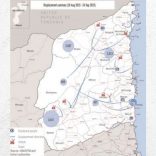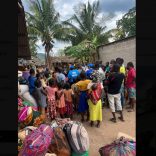Mozambique: Violence affecting civilians on track to reach record high in 2025, UN warns
South Africa:’s mass deportations in full pandemic, to Mozambique, Zimbabwe – Watch

FILE - Lindela Repatriation Centra [File photo: DW]
South Africa – the country worst-affected by Covid-19 in sub-Saharan Africa – has deported hundreds of Mozambicans and Zimbabweans from Lindela Repatriation Centre. Mozambican experts warn of violation of health protocols.
The South African Ministry of Interior repatriated some 977 migrants from the Lindela Repatriation Centre over the last weekend, including 439 Mozambicans and 538 Zimbabwean nationals.
These hurried mass deportations were prompted by the violence that broke out at the centre a week ago, resulting in the escape of 37 illegal immigrants.
The violence erupted following a strike by employees, who refused to work at the undocumented immigrants transit centre without adequate Covid-19 personal protective equipment (PPE). According to the South African Interior Ministry, deportations were accelerated after consultation with the embassies of Mozambique and Zimbabwe.
ALSO READ:Just In: Three more test positive for Covid-19; two are Mozambicans deported from South Africa
Egna Sidumo, a researcher and professor at the Joaquim Chissano University in Maputo, says the measure was legitimate, but questions its foundations.
“I think that this is a challenge for Mozambique and a challenge for the health authorities, but also for the diplomatic authorities, which, from then on, have a great responsibility to trace and eventually find more Mozambicans who are interested in returning to Mozambique and who may be registered and monitored by health authorities,” she says.
ALSO READ: Mozambique: One Mozambican deported from South Africa has Covid-19 – AIM report
Deportations violate protocols
The Lindela Repatriation Centre holds undocumented immigrants waiting for their legal status in South Africa to be determined or pending deportation.
Hélio Guiliche, a Mozambican academic, argues that deportations in the midst of the Covid-19 pandemic violated health protocols.
“It is worth remembering that they are leaving a country that is heavily infected and that, possibly, one or another [deported individual] may be infected,” he comments.
“Given their low income and poor economic conditions, they will not necessarily undergo voluntary testing. So, the authorities should take note of this and seek clarification from the South African authorities,” he says.
ALSO READ: Mozambique: New focus of Covid-19 in Gaza; one of the Sofala patients in Dondo district – A Verdade
Control at borders
In the current Covid-19 scenario, South Africa is the region’s hardest hit country, and the deportations are taking place at a time when the number of people infected by Covid-19 in Mozambique is also on the rise.
With new infections in Inhambane and Sofala provinces, Sidumo thinks that “Mozambique should start to be a little more serious in controlling the movement of people, specifically those crossing its borders”.
The Joaquim Chissano University researcher notes that, “given that the country [Mozambique] cannot refuse the entry of national citizens, it must redouble its efforts to ensure that these people are controlled so that they do not become a new source of infection in their areas of origin”.
South Africa by this Tuesday (12.05) had registered a total of 11,350 Covid-19 cases. Western Cape province is the epicentre of the disease in the country, with about 484 new cases of infection.
South African president Cyril Ramaphosa, in his weekly address to the nation, said that the country should be prepared to live with the virus for a year or two.











Leave a Reply
Be the First to Comment!
You must be logged in to post a comment.
You must be logged in to post a comment.